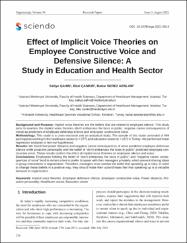| dc.contributor.author | Şahin, Safiye | |
| dc.contributor.author | Cankır, Bilal | |
| dc.contributor.author | Arslan, Bahar Serez | |
| dc.date.accessioned | 2021-12-12T17:01:23Z | |
| dc.date.available | 2021-12-12T17:01:23Z | |
| dc.date.issued | 2021 | |
| dc.identifier.issn | 1318-5454 | |
| dc.identifier.issn | 1581-1832 | |
| dc.identifier.uri | https://doi.org/10.2478/orga-2021-0014 | |
| dc.identifier.uri | https://hdl.handle.net/20.500.11857/3170 | |
| dc.description.abstract | Background and Purpose: Implicit voice theories are the beliefs that are related to employee silence. This study aims to examine the implicit voice theories (don't embarrass the boss in public, negative career consequences of voice) as predictors of employee defensive silence and employee constructive voice. Methodology: This study is a cross-sectional and an analytical study. The sample of this study consisted of 494 participants working in the healthcare sector (n = 277) and education sector (n = 217) in Turkey. We performed linear regression analyses to test our hypotheses. Results: We found that power distance and negative career consequences of voice predicted employee defensive silence while proactive personality and the belief of don't embarrass the boss in public predicted employee constructive voice. These results confirm the effect of implicit voice theories on employee silence and voice. Conclusions: Employees holding the belief of don't embarrass the boss in public and negative career consequences of voice tend to remain silent or prefer to speak with their managers privately, which prevent sharing ideas in group interactions in organization. Therefore, managers must combat the belief that speaking up is risky. In order to change these beliefs in a positive way, they should make their subordinates feel that speaking up is a valuable behavior in organization. | en_US |
| dc.description.sponsorship | TUBITAK 4005 projectTurkiye Bilimsel ve Teknolojik Arastirma Kurumu (TUBITAK) [118B056] | en_US |
| dc.description.sponsorship | This study has been developed by training and activities organized within the scope of TUBITAK 4005 project numbered 118B056. | en_US |
| dc.language.iso | eng | en_US |
| dc.publisher | Walter De Gruyter Gmbh | en_US |
| dc.relation.ispartof | Organizacija | en_US |
| dc.identifier.doi | 10.2478/orga-2021-0014 | |
| dc.rights | info:eu-repo/semantics/openAccess | en_US |
| dc.subject | implicit voice theories | en_US |
| dc.subject | Employee defensive silence | en_US |
| dc.subject | Employee constructive voice | en_US |
| dc.subject | Power distance | en_US |
| dc.subject | Pro-active personality | en_US |
| dc.subject | Healthcare sector | en_US |
| dc.subject | Education sector | en_US |
| dc.title | Effect of Implicit Voice Theories on Employee Constructive Voice and Defensive Silence: A Study in Education and Health Sector | en_US |
| dc.type | article | |
| dc.authorid | Cankir, Bilal/0000-0001-5126-8769 | |
| dc.authorid | Sahin, Safiye/0000-0003-1734-9586 | |
| dc.department | Meslek Yüksekokulları, Sağlık Hizmetleri Meslek Yüksekokulu, Tıbbi Hizmetler ve Teknikler Bölümü | |
| dc.identifier.volume | 54 | en_US |
| dc.identifier.startpage | 210 | en_US |
| dc.identifier.issue | 3 | en_US |
| dc.identifier.endpage | 226 | en_US |
| dc.relation.publicationcategory | Makale - Uluslararası Hakemli Dergi - Kurum Öğretim Elemanı | en_US |
| dc.identifier.wos | WOS:000694050700003 | en_US |
| dc.authorwosid | Cankir, Bilal/I-3860-2017 | |



















